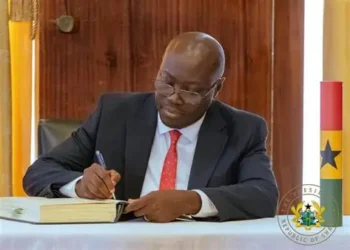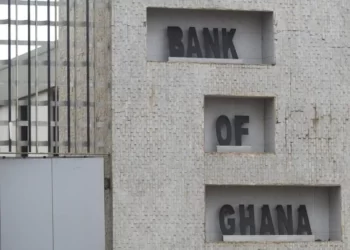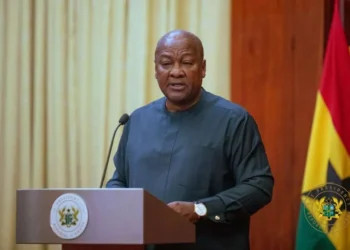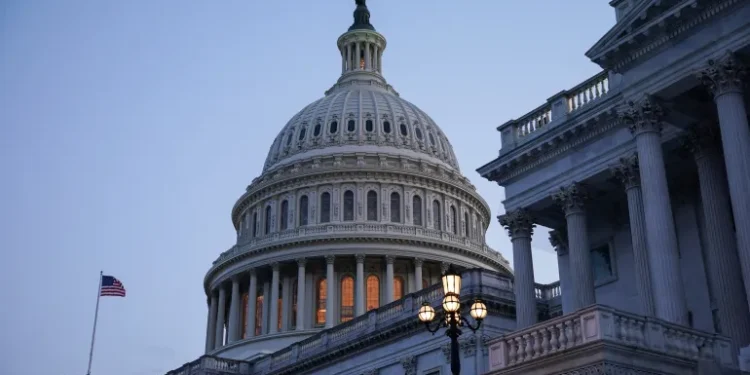Ghana stands at a crossroads as the next 12 to 18 months present two possibilities of either an upgrade or a downgrade.
The performance of the Ghanaian economy in the next few months could strip the country of its current rating or propel the economy to a more stable outlook. The determining factor of Ghana’s fate is the impact and effectiveness of its fiscal reforms.
“We could lower the rating on Ghana over the next 12-18 months if fiscal reform momentum stalled with Ghana recording wider budgetary deficits, underpinning a rise in public debt service costs, or straining the government’s ability to refinance maturing debt as it comes due.”
S&P Global
S&P Global Ratings upgraded Ghana from a ‘CCC+/C’ to a ‘B-/B’ in its latest report. This is interpreted as a stable outlook. Ghana also received a ‘B-‘ in its transfer and convertibility assessment, an upward revision from ‘CCC+’.
According to the agency, Ghana’s upgrade was due to the strong economic performance and stability achieved over the last 10 months, and the potential of the economy as it treads on a macroeconomic stability and fiscal discipline trajectory.
Condition for a Downgrade and Upgrade Scenario
The success of the fiscal reforms initiated by the current government could very well be what will make or unmake Ghana in the eyes of S&P Global.

The agency’s forecast could come under pressure to reverse its rating if the current favorable terms of trade weaken at a fast rate, export volumes weaken, external debt imbalances rise, or debt restructuring stalls.
“Although not our base case, the rating could face pressure if the remaining part of debt restructuring stalls, potentially stemming from disagreements between various groups of Ghana’s creditors over comparability of treatment principles and terms they receive under the G20 Common Framework restructuring process.”
S&P Global
On the other hand, if the government continues its fiscal discipline through responsible spending, the country’s need to go to the international market will be checked. This course will also increase Ghana’s credibility and integrity on the international market, strengthening our foreign financing position.
“We could raise the rating in the next 12-18 months if Ghana consistently sustained fiscal deficits at lower levels, reducing debt service costs and strengthening its access to foreign financing while its external position continued to strengthen–including the accumulation of additional foreign currency reserves, for example.”
S&P Global
According to S&P Global, Ghana’s upgrade stems from the country’s “gradually strengthening balance of payments and fiscal positions,” which the agency said, “have been supported by resilient growth of the domestic economy as well as favorable terms of trade which includes prices for gold and cocoa–Ghana’s key export items–together accounting for over 60% of goods’ exports.”

The agency forecast that “Ghana’s gross international reserves will strengthen to $10.4 billion (9% of GDP) at the end of 2025 from $6.8 billion a year earlier.” This projection and upgrade is based on the current growth rate.
The reversal of the current growth path through complacency, indiscipline, and going back to ‘business as usual’ could destabilize the country’s performance. Ghana, at this point, requires consistency and frequently renewed efforts to stay the course of growth and development.
S&P Global’s Assessment of Ghana’s Efforts
The agency is aware of the government’s reforms, safeguards, and steadfastness in restoring the economy upon assuming office in December 2024. The government has enacted several initiatives to maintain the current course. This includes a “mandated 1.5% of GDP primary surplus on an annual basis, for debt to be brought to 45% of GDP by 2034, as well as a proactive framework for correcting future fiscal deviations.”

Based on the current efforts and results attained, the agency forecast that “inflation will remain under 10% from over 20% at the start of 2025, while the cedi has appreciated by about 30% compared with the U.S. dollar so far this year.”
The agency recognized the government’s local currency debt exchange success in 2023 and $13.1 billion worth of Eurobonds in October 2024, after defaulting in 2022. The agency alluded that the “authorities are currently in talks to finalize the restructuring of the remaining $5 billion worth of official and commercial debt, which constitutes about 7% of total public debt, subject to restructuring negotiations with the rest thus already settled.”
The upward rating does not imply Ghana is doing well on all fronts, the agency pointed out. Certain flaws need urgent attention and steps to improve the country’s outlook. These include weak institutions, debt servicing costs, and the inability of the economy to withstand climate and external shocks.
“Despite the improvements, our rating on Ghana remains constrained by still weak institutional arrangements, elevated government debt levels, and debt service costs. The economy is susceptible to erratic weather and external shocks, particularly given its reliance on agriculture (20% of GDP) and gold exports (over 60% of goods exports in the first half of 2025).
“These could face pressure should prices fall more significantly than we currently anticipate. We also note that fiscal reforms are still in their early stages and are thus untested through election cycles, with risks of fiscal slippages through 2028.”
S&P Global
The government of the day needs to be relentless and focused on its current growth path to achieve a higher upgrade in the next few months.
READ ALSO: Baffoe-Bonnie’s Chief Justice Nomination, a Grave Breach of Constitutional Order – NPP























